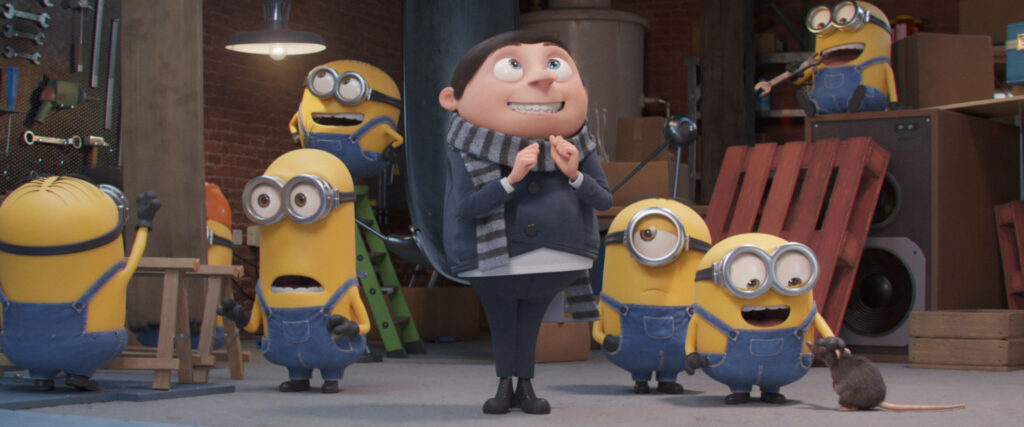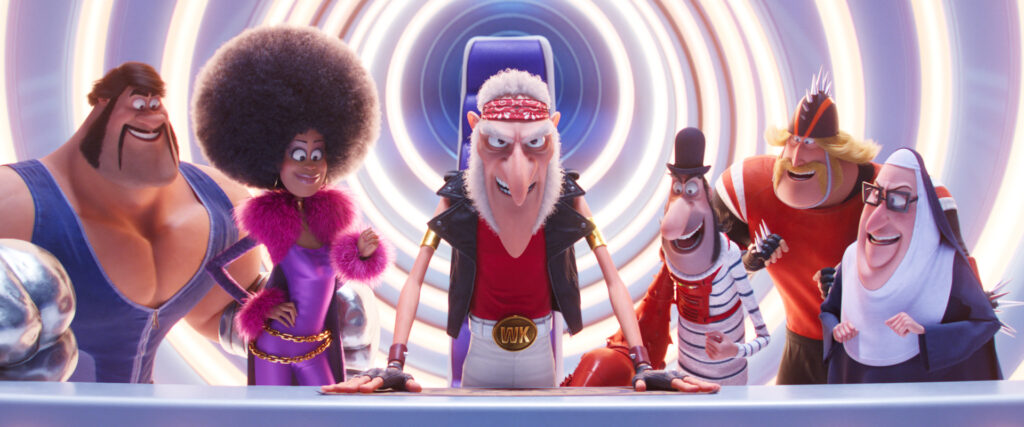June 16, 2023
by Carla Hay

Directed by Wes Anderson
Culture Representation: Taking place in 1955, in the U.S. Southwest and in New York City, the comedy film “Asteroid City” features a predominantly white cast of characters (with a few African Americans and Latinos) representing the working-class and middle-class.
Culture Clash: Told as a stage play within a TV show, “Asteroid City” tells the story of how a small town reacts to a visit from an outer-space alien.
Culture Audience: “Asteroid City” will appeal primarily to people who are fans of filmmaker Wes Anderson and comedies with intentionally quirky characters and sometimes bizarre scenarios.

“Asteroid City” is exactly what you think a Wes Anderson movie is about how people react to seeing an outer-space alien. The comedy is hit or miss. Anderson’s recent movies seem like they’re competing with each other to have the most celebrity cameos. “Asteroid City” (which was directed by Anderson) had its world premiere at the 2023 Cannes Film Festival. Anderson co-wrote the “Asteroid City” screenplay with Roman Coppola, who is a cousin of Jason Schwartzman, one of the stars of the film.
“Asteroid City,” which is set in 1955, is told as a play within a TV show. All it means is that it’s an excuse to add more stars to the already star-studded cast. Overstuffing the movie with famous cast members can actually be detriment when most of these characters remain underdeveloped. And it will just lead to disappointment for the fans of the cast members (many of whom could easily headline films on their own) when they find out that the screen time of many of these celebrities is barely enough to be in a short film.
The constant parade of stars also seems like showboating from Anderson and the other “Asteroid City” filmmakers, as if to prove that all of these famous people are so in awe of Anderson, they’d be willing to do even the tiniest role in one of his movies. It certainly might explain why Margot Robbie has an utterly useless role as an unnamed actress/wife in “Asteroid City,” where all she does in the movie is talk for a few minutes in a forgettable conversation. “Asteroid City” makes good use of its principal cast members, but gets bogged down by all the distracting celebrity cameos.
The movie begins with black-and-white footage of a nameless TV host (played by Bryan Cranston) explaining that viewers will be getting a behind-the-scenes look at the making of a play called “Asteroid City.” The play is written in New York City by playwright Conrad Earp (played by Edward Norton), while the ensemble cast is led by Jones Hall (played Schwartzman) and Mercedes Ford (played by Scarlett Johansson). This behind-the-scenes footage is in black and white (as it would be in television in 1955), but the scenes with the play are in bright Technicolor-inspired lighting that would have been standard with movies released in 1955.
Schubert Green (played by Adrien Brody) is the play’s director. Polly (played by Hong Chau) is Schubert’s assistant. Saltzburg Keitel (played by Willem Dafoe) has a classroom that is used as rehearsal space for the play. All three of these characters are seen in short interludes and don’t add much to the overall story.
Asteroid City is in an unnamed state in the U.S. Southwest. In the “Asteroid City” play, a war photographer named Augustine “Augie” Steenbeck (also played by Schwartzman) is a recent widower. He is on a road trip by car to Asteroid City, a very small Southwestern town (population: 87), where the biggest attractions are a large meteor crater and a celestial observatory nearby. Augie is traveling with his 14-year-old son Woodrow Steenbeck (played by Jake Ryan) and triplet daughters Andromeda (played by Ella Faris), Pandora (played by Gracie Faris) and Cassiopeia (played by Willan Faris), who are about 7 or 8 years old.
The Steenbeck family is going to Asteroid City for the weekend celebration of Asteroid Day, commemorating September 27, 3007 B.C., when the Arid Plains meteorite crashed on Earth. Woodrow is also set to get a prize as one of the five winners of the Junior Stargazer Space Cadet Awards, given to young people who are aspiring astronomers. However, Augie’s car breaks down in Asteroid City. A unnamed, bumbling mechanic (played by Matt Dillon) is the nearest person who can fix the car.
After Augie finds out that he and his children are stuck in Asteroid City, Augie calls his stern father-in-law Stanley Zak (played by Tom Hanks) to ask Stanley to pick up the kids because “the car exploded.” Stanley is reluctant to come to the rescue of his stranded son-in-law and grandchildren because Stanley thinks that Augie needs to take responsibility for the kids. Stanley is annoyed that Augie has not told the children that the children’s mother (who was Stanley’s daughter) died three weeks ago.
It’s mentioned in the movie that she died from a unnamed illness. Eventually, Augie awkwardly tells the children about their mother’s death. He also tells them that she has been cremated. Her ashes are in a plastic bowl that Augie has with him. And as soon as cremated ashes of a loved one are shown in a comedy, you just know that something is going to happen to those ashes in a comedic part of the plot.
Meanwhile, this small town is about to get a much bigger temporary population when more visitors arrive. These other guests include famous actress Midge Campbell (played by Johansson), who (by her own admission) is vain and selfish. She is in Asteroid City because her teenage daughter Dinah (played by Grace Edwards) is one of the recpients of the Junior Stargazer Space Cadet Award. It’s mentioned that Midge has two younger children from her marriage to her second ex-husband
Also in Asteroid City is country musician Montana (played by Rupert Friend) and his band. Montana dresses like a cowboy and seems to be attracted to a schoolteacher in her 20s named June (played by Maya Hawke), who has arriveed by school bus with a class of 10 students, who are each 8 years old. Montana and June, like many of these supporting characters, have no real bearing on the outcome of the story.
Other visitors to Asteroid City who are very extraneous characters include egotistical businessman JJ (played by Liev Schrieber) and his mild-mannered teenage son Clifford (played by Aristou Meehan), who only seem to be in the movie to show that Augie and Woodward aren’t the only characters in “Asteroid City” who have father/son tensions. Clifford is one of the award recipients.
Other unnecessary characters are Sandy (played by Hope Davis) and her teenage daughter Shelly (played by Sophia Lillis), who are only memorable for wearing matching Girl Scout-type uniforms. Shelly is also one of the award recipients. It makes no difference to the movie’s story if there were three, four or five teens getting these awards.
Another parent-teen duo in “Asteroid City” are scientist Roger (played by Stephen Park) and his overachieving son Ricky (played by Ethan Josh Lee), who has somewhat of a rivalry with Woodrow about who knows the most about astronomy. Ricky is actually essential to the plot, since he makes a certain decision regarding the outer-space alien. Ricky’s decision has an effect on other plot developments. Meanwhile, Woodrow and Dinah have a growing attraction to each other.
Steve Carell is in the movie for less than five minutes as the manager of Asteroid City’s only motel. The observatory is run by Dr. Hickenlooper (played Tilda Swinton), who us the expected eccentric character that Swinton always to plays in Anderson’s movies. A crater meteorite that’s the size of a softball is one of the prized possessions on display at the observatory.
A very by-the-book military officer named General Grif Gibson (played by Jeffrey Wright) is in Asteroid City to lead the Asteroid Day festivities, which includes a tour of the observatory, a picnic supper, the viewing of the Astronomical Ellipses, and the awarding of the annual Hickenlooper Scholarship. General Gibson has a trusted, unnamed aide-de-camp (played by Tony Revolori), who is just a rehash of the “eager young man” roles that Revolori has played in other Wes Anderson movies.
The first half of “Asteroid City” is a string of vignettes where the characters are quirky and often blurt out things in a tactless way that’s supposed to be amusing. Augie and Midge are the most “no filter” of these characters. And so, it should come as no surprise that they become attracted to each other. It’s just like a Wes Anderson movie for two single parents to be attracted to each other at the same time the parents’ two teenage kids are attracted to each other.
“Asteroid City” doesn’t get really interesting or amusing until the arrival of the space alien, which is filmed like it would be for a stage production. The reactions to this space alien are the movie’s commentaries on greed and exploitation in society. There’s nothing wrong with any of the performances by the cast members. But it says a lot that “Asteroid City,” which is filled with talented people (many of whom are Oscar winners and Oscar nominees), doesn’t have an Oscar-worthy performance in the bunch. The movie’s production design is impeccable, but “Asteroid City” is a comedy that’s more enamored with the setup of jokes rather than the jokes themselves.
Focus Features released “Asteroid City” in select U.S. cinemas on June 16, 2023, with a wider expansion to more U.S. cinemas on June 23, 2023.




